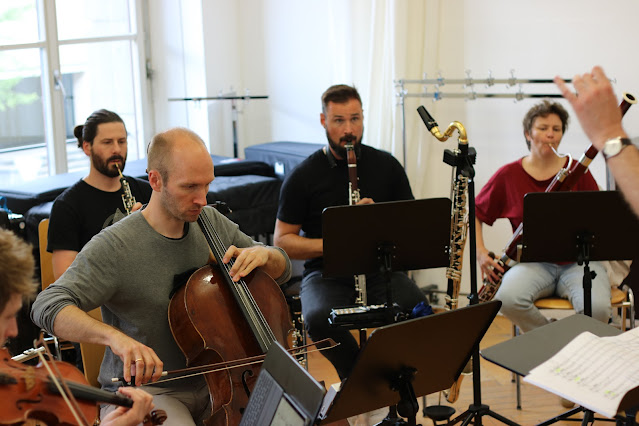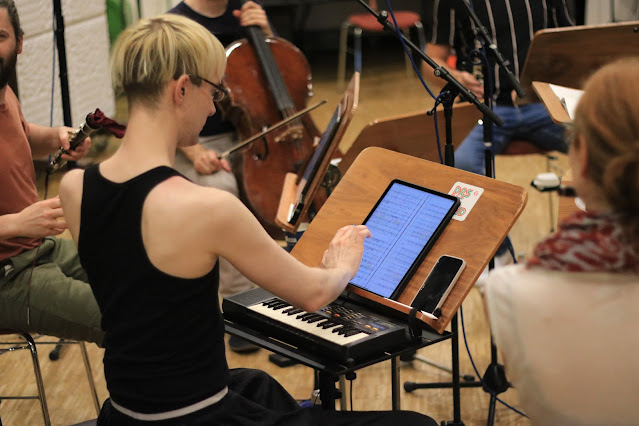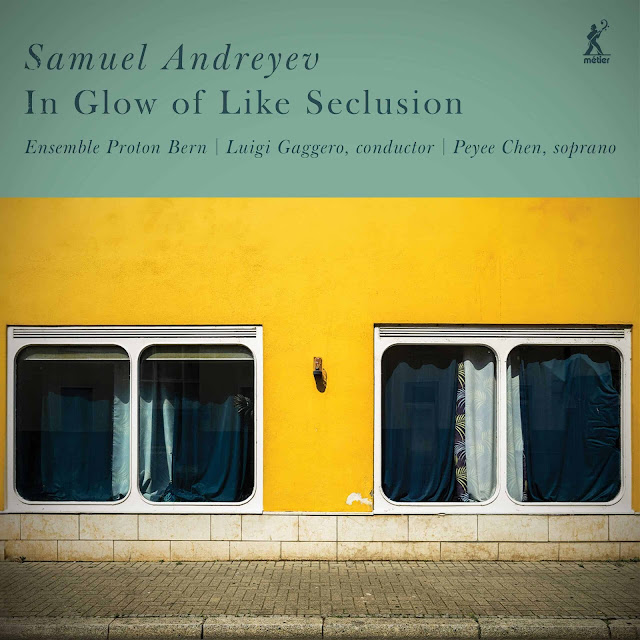Canadian composer Samuel Andreyev released his latest album, In Glow of Like Seclusion, on the Métier label in November. His second collaboration with the Swiss Ensemble Proton Bern, the disc also features conductor Luigi Gaggero and soprano Peyee Chen in Samuel's the cantata In Glow of Like Seclusion setting the poetry of J H Prynne, along with Sonata da Camera, Sextet in Two Parts and Vérifications.
 |
| Samuel Andreyev self portrait |
Samuel's collaboration with Ensemble Proton Bern dates back several years, and with In Glow of Like Seclusion, Samuel wanted to create a disc under the best possible conditions and reach as many people as possible. The disc features four of his ensemble pieces, chosen partly because of the constraints in recording and practical constraints regarding instrumentation. Vérifications was written some ten years ago whilst two of the other works on the disc, In Glow of Like Seclusion and Sonata da Camera, were written for the ensemble and premiered by them. The fourth work, Samuel's Sextet just happened to fit.
Many composers work with a large number of people, but Samuel prefers to consolidate his working relationships and concentrate on projects with fewer people, so he develops the relationship, spending more time with them and reducing his need to travel. He likes getting to know performers, concentrating on relationships that resonate so they can work together more.
With Ensemble Proton Bern, both he and the ensemble had an interest in expanding the sonic palette, using unusual instruments to reimagine what the ensemble might sound like. The ensemble's core instrumentation is flute, oboe, clarinet, bassoon, piano, harp, violin and cello. In many ways, it is a difficult ensemble to write for as the strings are outnumbered by the wind, but he regards this acoustic difficulty as a challenge. There are ways around it and he enjoys the need to find a solution, so for instance, in Sonata da Camera he wrote for a continuously unfolding sequence of sub-groups within the ensemble, treating the instruments soloistically rather than orchestrally. The works in the disc also add extra instruments to the ensemble including horn and percussion, whilst the cantata includes a mandolin solo and Vérifications features a 1980s Cassio keyboard along with piccolo, piccolo oboe and piccolo clarinet.
 |
| Ensemble Proton Bern in rehearsal (Photo Samuel Andreyev) |
The cantata uses texts by the poet J.H. Prynne (born 1936), who Samuel sees as one of the foremost modernist English poets of the post-war period, a leading light of the Cambridge school. One of Prynne's best-known collections is The White Stones (1969). Samuel finds him a totally fascinating artist, commenting that Prynne's poetry is seen as difficult to read and understand but Samuel regards this as a cliché. For Samuel, there is a way into Prynne's poetry, but you need a tolerance of ambiguity and Samuel likens reading the poetry to simultaneously having ten extraordinary conversations with ten people on difficult topics.
It was Samuel who selected the poetry he set for the cantata. Over two years he read lots of Prynne's poetry and critical writings along with criticism of Prynne's work. He chose poems from Prynne's 2018 collection Or Scissel. The poems refer to many things simultaneously and readings of them vary. Samuel chose to focus on the experience of reading the poems, and he finds this almost a psychedelic experience, a continuously rapidly expanding field of meaning. For Samuel, the poems he set refer to the intersection between the natural and the industrial world. Prynne is a humanist and his poems have an altruistic character, highlighting the importance of paying attention to the world around us and the necessity to beware of deceitful language.
Samuel finds the poetry thrillingly alive, and reading the poems gave him musical ideas. For Samuel, the poetry behaves polyphonically with multiple voices and strands, striking him as a very musical idea, something he wanted to put into music. Though he admits that it was very difficult to do. But the cantata is both his attempt to come to terms with setting Prynne and coming to terms with his own musical ideas. He refers to the music of the cantata as something of a paradox, his style is less complex and streamlined, not emulating the poetry but allowing the words to set the stage and then amplifying them. After all, he comments that the words are complex already.
 |
| Ensemble Proton Bern in rehearsal (Photo Samuel Andreyev) |
When I ask how he would describe his musical style, Samuel admits that at first, he wouldn't. But then he goes on to explain that he is aiming for something simple, yet not lacking in richness. He wants to create a level of immediate encounter that is compelling. He tries to do this by imagining the listener as a collective 'We' and addressing them. This is something he had been doing over the last four or five years but has intensified recently. And he points out that modern composers too frequently address 'I' not 'We'.
He is aware of the need to talk to people, to connect with them and he regards an unsuccessful artist as one who does not connect. He points out the incredible technical communication possibilities available today, but too many artists do not use them and artists often do not have a voice. That artists are not taken sufficiently seriously and are absent from public media is something that needs to be addressed. Artists themselves are simply not on the radar.
Samuel has asked other contemporary composers if things are going well and received the reply that they are because 50 people attended a performance. But this is for a work that takes a year to create and costs something like £20,000. Samuel sees these numbers as catastrophic beyond all measure. After all, at zero cost you can set up a YouTube channel and reach a million people. This is a subject that Samuel feels passionate about, adding that we should be embarrassed at the pathetic state of the arts' lack of reach. For Samuel, the solution is to leverage new media to reach people, but it is important not to simply dabble but to invest time properly.
We need to shift the focus from the artist's 'I' to the collective 'We', but not via a populist agenda or dumbing down. Artists should acknowledge the need to address the collective 'We' rather than simply talking amongst themselves as happens at the moment. Samuel likens this shift in attitude to artists trying to squeeze through a small aperture when there is a wide-open gateway nearby that we have not noticed.
 |
| Samuel Andreyev (Photo: Le Républicain Lorrain) |
Samuel knew from childhood that he wanted to be an artist, but only decided he wanted to be a composer when he was a teenager. Up to that point, he was interested in the visual arts but also played the oboe, cello and piano. He wrote songs and released albums as a singer songwriter, exploring different paths but composition became his focus and he concentrated on it. Now that he is older, he is adding other things back into the mix again, broadening his outlook from just composition.
His rate of creation varies from piece to piece. This is partly because he tries to write at the edge of his competence. He explains that composers tend to focus on the things they know how to do, to play to their strengths. The temptation is to consolidate these strengths. He understands this, as the alternative is that you torture yourself in each piece. But Samuel gets bored, and so each project makes him learn new skills and new techniques. The process is not an easy one. For instance, in a recent piece for chamber orchestra, he was consciously taking the music into great dynamic contrasts, something he'd not done before. It is an arduous process as he does not allow himself the ease of settling into things he does well. And each time he succeeds in a piece, he then sets himself a greater challenge.
The disc, In Glow of Like Seclusion, was released on CD and streaming on 17 November but in mid-January, there will be a vinyl double LP. He describes himself as super-excited about this event; the LP looks fantastic and he also took the photos that are used in the artwork on the disc. Looking ahead he has an opera project, and he is continuing work on an ongoing series of piano pieces which started in 2007. He has an album of piano music in the works and a disc of chamber music. He would also like to do more orchestral music.
Samuel Andreyev: In Glow of Like Seclusion - Ensemble Proton Bern, Luigi Gaggero (conductor), Peyee Chen (soprano) - Métier MEX 77119
Support Planet Hugill, buy In Glow of Like Seclusion from Amazon.
Never miss out on future posts by following us
The blog is free, but I'd be delighted if you were to show your appreciation by buying me a coffee.
Elsewhere on this blog
- Dichterliebe Reimagined: Koen van Stade & Neal Peres Da Costa bring creative freedom & musical rhetoric to bear on Schumann's song cycle - record review
- A lifetime's experience: John Nelson finally records Messiah in a finely engaged performance, with a fantastic quartet of soloists - record review
- The Goldberg Variations Reimagined: Rachel Podger and Brecon Baroque at Kings Place - concert review
- Bach's Christmas Oratorio from Masaaki Suzuki and the Orchestra of the Age of Enlightenment - concert review
- Organ Re-born! a mini-concert series mounted in celebration of the return and rebirth of Norwich Cathedral’s organ - concert review
- The Hidden Light: composer Joanna Marsh on her triptych of pieces for the choir of St John's College, Cambridge - interview
- Early Beethoven & Verdi's only string quartet in London's oldest surviving Livery Hall - concert review
- A distinctive voice & a richly rewarding sound-world: songs by Franco Alfano from Anna Pirozzi & Emma Abbate -record review
- Handel by candle-light & a gig on Jimi Hendrix's bed: Handel Hendrix After Dark - concert review
- Captivating & fascinating: Goldberg from Syriab Trio and Trio d'Iroise, bringing together Western classical, Arabic music and Bach - record review
- A remarkable sense of energy & engagement: Wagner's Die Walküre from the London Opera Company at St John's Smith Square - opera review
- Home












No comments:
Post a Comment